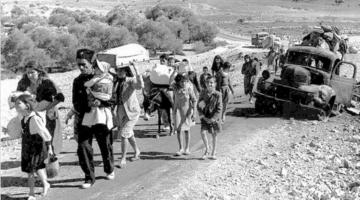U.S. and other foreign interventions are the cause of Haiti's ongoing crises.
The first calls for foreign intervention into Haiti came soon after the assassination of Haitian President Jovenel Moïse in Port-au-Prince on July 7th. Intervention was justified by the claim that Moïse’s death had created a vacuum of political leadership and authority that would push Haiti into a maelstrom of chaos and anarchy -- into what the Guardian announced as a “violent new era.” Only intervention, led by the US and supported by its international partners, could save the troubled republic from an inevitable crisis.
By all accounts, the press projections of Haiti falling to barbarism after the assassination has not happened. But the calls for foreign intervention have continued. These calls have ignored two important and consequential facts. First, previous foriegn interventions have been unmitigated disasters. They have led to long-term military occupations that destroyed the Haitian state and marginalized civil society while leaving tens of thousands of Haitians displaced or dead. Second, and most importantly, Haiti is already under occupation. Calls for “intervention” are not only disingenuous, but actually redundant.
The first US intervention and occupation of Haiti officially began with an echo of the present. In 1915, Haitian president Theodore Guillame Sam was murdered – dragged out of the French legation and killed in the streets – after he had imprisoned and then killed a number of his political opponents. Fearing political chaos, and with a desire to protect US interests, persons, and property, the US landed three hundred troops on July 28th, 1915, initiating a military occupation that lasted nineteen years, until 1934.
But the calls for intervention and the strategies for occupation had long preceded Sam’s murder. In the years leading up to the landing of US marines in 1915, the National City Bank of New York was becoming increasingly involved in Haiti’s financial affairs. They pushed for control of Haiti’s railroads, ports, the national bank, and the sovereign debt – and they were encouraged by the US State Department, who had adopted the well-known policy of “dollar diplomacy” throughout the Caribbean region. Bank managers served as shadow representatives of the State Department in Haiti.
CIty Bank officials had already called for US military intervention to protect their Haitian investments before 1914. In 1914, bank vice president Roger Leslie Farnham wrote a memorandum outlining a strategy for occupation, saturated with racial paternalism and ideas of Haitian inferiority, for US secretary of state William Jennings Bryan. The same year, City Bank officials sent a request for US Marines to land in Haiti to move the $500,000 gold reserve from the Banque National d’Haiti in Port-au-Prince to a Wall Street vault. They asserted the action was taken to protect their investments. Haiti’s politicians viewed it as theft, and a deliberate attack on the Republic’s sovereignty.
When intervention and occupation did occur in 1915, the bank consolidated its near-monopoly control of Haiti’s finances, banking, and industry. During the first occupation, the US rewrote the Haitian constitution and installed a puppet president, imposed press censorship and martial law, and brought Jim Crow policies and forced labor to the island. It also initiated a “pacification” campaign against those Haitian militants engaged in armed struggle to protect the republic’s sovereignty. The US military dropped bombs and burned villages, tortured and murdered peasants, and hunted rebel “bandits” for sport.
Of the stated aims of the occupation – building infrastructure, expanding education, and providing internal and regional stability – little was achieved. The longstanding result of the US occupation was the establishment and training of a local police force, the Gendarmerie d'Haïti. Years after the occupation, this police force was used to terrorize the Haitian people.
US troops withdrew in 1934 after a sustained period of protest, begun in 1929 by Haitian students and eventually joined by all classes of Haitians and Haitian allies in the international community.
The US would continue to intervene Haitian affairs, first supporting the brutal dictatorship of Francois “Papa Doc” Duvalier and Jean-Claude “Baby Doc” Duvalier, and then again in 1991 as the CIA bankrolled a coup d’etat against the country’s first democratically elect president, Jean-Bertrand Aristide. The coup was not consolidated because of continuous resistance from the Haitian people. By 1994, US president Bill Clinton’s administration was forced to bring Aristide back to Haiti after 3 years in exile, with 20,000 troops brought in to quell Haitian resistance. But Aristide was now a hostage to US neoliberal policy. The US troops remained until 1999.
The second occupation of Haiti began in 2004 and was initiated after a coup d'etat sponsored by the U.S., France, and Canada that dethroned elected Haitian president Jean-Bertrand Aristide. Aristide was kidnapped by US marines and sent to the Central African Republic. US President George W. Bush announced afterwards that he was sending US forces to Haiti to “help stabilize the country.” It is clear, as Glen Ford and Peter Gamble remind us, “George Bush didn’t invent U.S. aggression against Haiti; that’s been U.S. policy since 1804.”
The 2004 illegal coup d’état was both enforced and cleaned up with the sanction of the UN. The UN took over from US forces and established the United Nations Stabilization Mission in Haiti (or MINUSTAH) for the tasks of military occupation under the guise of establishing peace and security.
A multi-billion dollar operation, MINUSTAH had, at any given time, between 6000 and 12,000 military troops and police stationed in Haiti alongside thousands of civilian personnel. Like the first US occupation, the UN occupation under MINUSTAH was marked by its brutality towards Haitian people. Civilians were brutally attacked and assassinated. “Peace-keepers” committed sexual crimes. UN soldiers dumped human waste into rivers used for drinking water, unleashing a cholera epidemic that killed between 10,000 and 50,000 people.
The Core Group -- an international coalition of self-proclaimed non-Black “friends” of Haiti -- emerged through the MINUSTAH occupation in 2004. Its stated goal was to oversee Haiti’s governance. Meanwhile, as with the first occupation, the US and MINUSTAH trained Haitian police forces, reintegrating many of the rogue members into these forces. The US, in collusion with MINUSTAH and the Core Group, also over-rode Haitian democracy, installing both neo-Duvalierist Michel Martelly and his PHTK party, alongside Martelly’s protege and successor, Jovenel Moïse. Moreover, it was under occupation that Haiti was devastated by the 2010 earthquake; all the pledges of humanitarian aid and assistance and the promises to “build back better” have amounted to nothing, the funds grifted by the Haitian oligarchy and comprador bourgeoisie, as well the international community.
While it is claimed that this occupation officially ended in 2017, with the dissolution of MINUSTAH, the UN has remained in Haiti through a new acronym: BINUH, the United Nations Integrated Office in Haiti. BINUH has had an outsized role in Haitian internal political affairs. For example, soon after Moïse was killed, its representative, Helen La Lime, asserted that Claude Joseph would be installed as Haiti’s leader. Later on, the “Core Group” switched gears and demanded that Ariel Henry should be president. And this is exactly what happened when a “new” Haitian government was announced on July 20, 2021, with Henry as leader. This without any say from the Haitian people.
It would seem that the goal, and perhaps success, of this occupation has been to not only permanently quell the last vestiges of the mass movement that emerged through the fall of the Duvalier dictatorship and culminated in the 1990 election of Jean Bertrand Aristide. The objective was to also completely and fatally destroy the Haitian state. And with that, the turning of Haiti into a permanent vassal state. In this, the self-hating comprador bourgeoisie, the poodles for white supremacy, have played a significant role. It is noteworthy that, in the wake of Moïse’s assassination, the comprador bourgeois lapdogs (such as Claude Joseph, Joseph Lambert, Ariel Henry) as well as the nonBlack oligarchs (such as Reginal Boulos) rushed first to get the blessings of their white overlords, representatives of the UN occupation force, the Core Group and the U.S. State Department.
For Haiti, both the first occupation, in 1915, and the second, in 2004, were unmitigated disasters. Both were premised on the idea that not only was Haiti falling into chaos and anarchy, but with the deeply racist notion that Haitians are unable to govern themselves. Be it under watch of US Marines, a multinational UN force, or an international cohort of technocratic experts in security and democracy, it seems likely that the ongoing second occupation will be intensified by a formal foreign military intervention.
The occupation will only end with the complete withdrawal of the imperial powers from Haiti.
Peter James Hudson is a writer, editor, and historian who teaches Black Studies at UCLA. He is the author of Bankers and Empire: How Wall Street Colonized the Caribbean.
Jemima Pierre is a contributor to Black Agenda Report, the Haiti/Americas Coordinator for the Black Alliance for Peace, and a Black Studies and anthropology professor at UCLA.



















